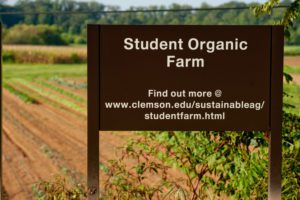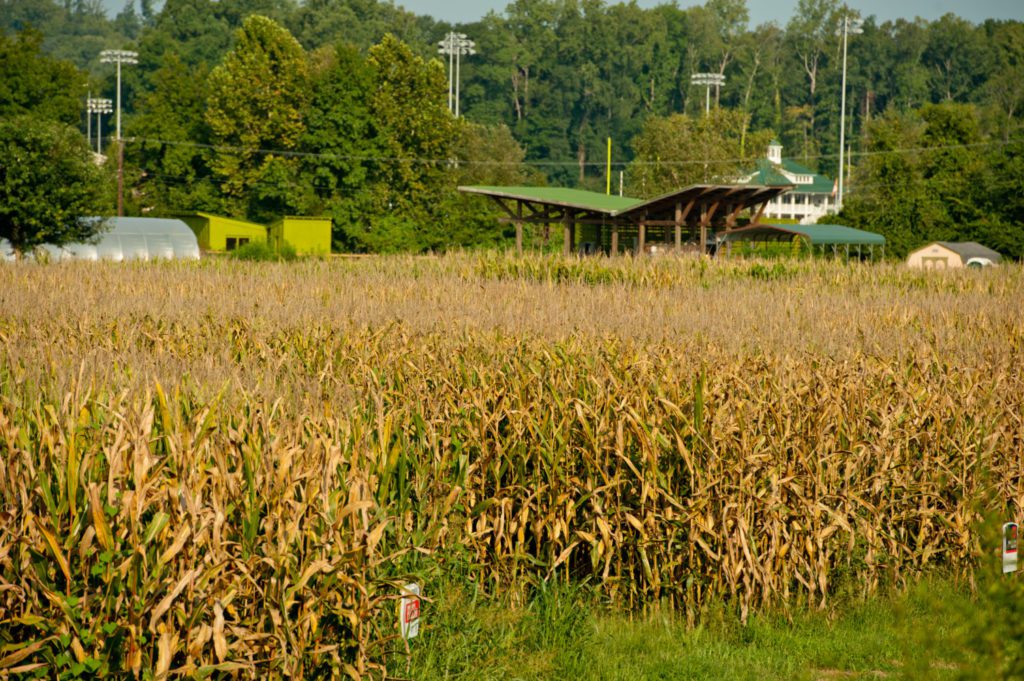Dec 12, 2018Clemson campus farm launches weekly farm market, expands research
Clemson University will expand its sustainable and organic farming research and launch a weekly farm market on its most historic agricultural land.
Calhoun Fields, or The Bottoms as it is commonly known, lies between Hartwell Lake and Perimeter Road on the Clemson University campus and is the location of Clemson’s Student Organic Farm and Community Supported Agriculture Program (CSA). It is also land that was first farmed by Cherokee Indians, then by John C. Calhoun and Thomas Green Clemson.
The Community Supported Agriculture Program will be replaced by a weekly farm market at the Student Organic Farm. The market will launch May 3, 2019, and be held every Friday from 2:30 to 5:30 p.m. through November.
David Robb manages the farm and is a graduate student in Clemson’s plant and environmental sciences department. In a recent email sent to CSA members, Robb said replacing the CSA with a farm market would allow more acreage to be used for the university’s already robust organic and sustainable farming research. Robb also said the farm market would have a wider impact.
“CSA shares were expensive and committed people to finding uses for a large amount of produce week after week for two 14-week seasons. The farm market will be more affordable for a wider public, including students. People will be able to just swing by on Fridays and buy what they want. The change will also allow us to use more acreage for important research,” Robb said.
Clemson’s College of Agriculture, Forestry and Life Sciences has been awarded several grants from the USDA to support its efforts to find new crops for southeastern U.S. and South Carolina growers to produce.
Clemson professors Dil Thavarjah, Rick Boyles and Stephen Kresovich, received a nearly $1 million grant from the USDA to develop pulse and cereal grain crops that can be grown organically in South Carolina and to help South Carolina farmers benefit from growing them. Thavarajah, and Kresovich also received a $150,000 seed grant from the National Institute of Food and Agriculture to study how growing lentils in different locations can bolster the plants’ nutritional quality, which could be a key in fighting food insecurity.
“The changes taking place at Calhoun Fields are an example of Clemson’s continued commitment to its land-grant mission of teaching, research and Extension in the agricultural sciences. What we learn there will ultimately help South Carolina farmers grow more food more efficiently in the race to feed a growing world population,” said Paula Agudelo, interim associate dean of research and graduate studies for the college.
Crop variety trial research at Calhoun Fields is already helping feed local communities suffering from food insecurity. In collaboration with Greenville Health System and Clemson University, Greenville-based nonprofit Feed & Seed created the Farm to Belly program. The program was designed to educate and encourage healthy eating habits in children as young as three years of age by introducing them to fresh vegetables and fruits – not only by taste, but by learning how to cook at home with their families. More than 180 children and their families participated in the program at the North Franklin Road Head Start Center in its first year. It has grown to nearly 400 families participating across four schools through 2021.
Calhoun Fields is a proving ground for some of the vegetables provided through the Farm to Belly program.

“Our primary motivation is to determine what products will grow that will be the most interesting to families in need. We can test that they can be grown locally at the organic farm. They’re collecting all the data, so we’ll have all the information to grow these specific carrots or these specific Detroit dark red beets and go to other growers and show them how to grow the carrots and beets,” said Mike McGirr, Feed & Seed executive director.
McGirr said more than 40 percent of Upstate farmland is fallow and he sees research being conducted at Calhoun Fields as an incubator where farmers can learn how to grow new crops that will help them enter new markets.
“For example, the opportunity for people to do specialty grains for livestock feed, for human consumption, for the beer industry is unlimited. We need a place where small measurable data can be collected in tiny little plots, and that place is Calhoun Fields,” McGirr said.
Calhoun Fields is part of the Simpson Research and Education Center (REC), which consists of the research farms located on and around Clemson University’s main campus, including: Calhoun Fields, LeMaster Dairy Cattle Center, Morgan Poultry Center, Musser Fruit Farm, Simpson Beef Cattle Farm and the Starkey Swine Center.
The Simpson REC is one of six Clemson Research and Education Centers strategically located throughout the state according to the state’s distinct soil and climate regions. These RECs, collectively known as the Clemson Experiment Station, are a part of a nationwide system of scientists working to improve the quality of life for people in their home state, nation and the world.
– Jonathan Veit, Clemson University College of Agriculture, Forestry and Life Sciences
Top photo: The Student Organic Farm at Calhoun Fields.

















